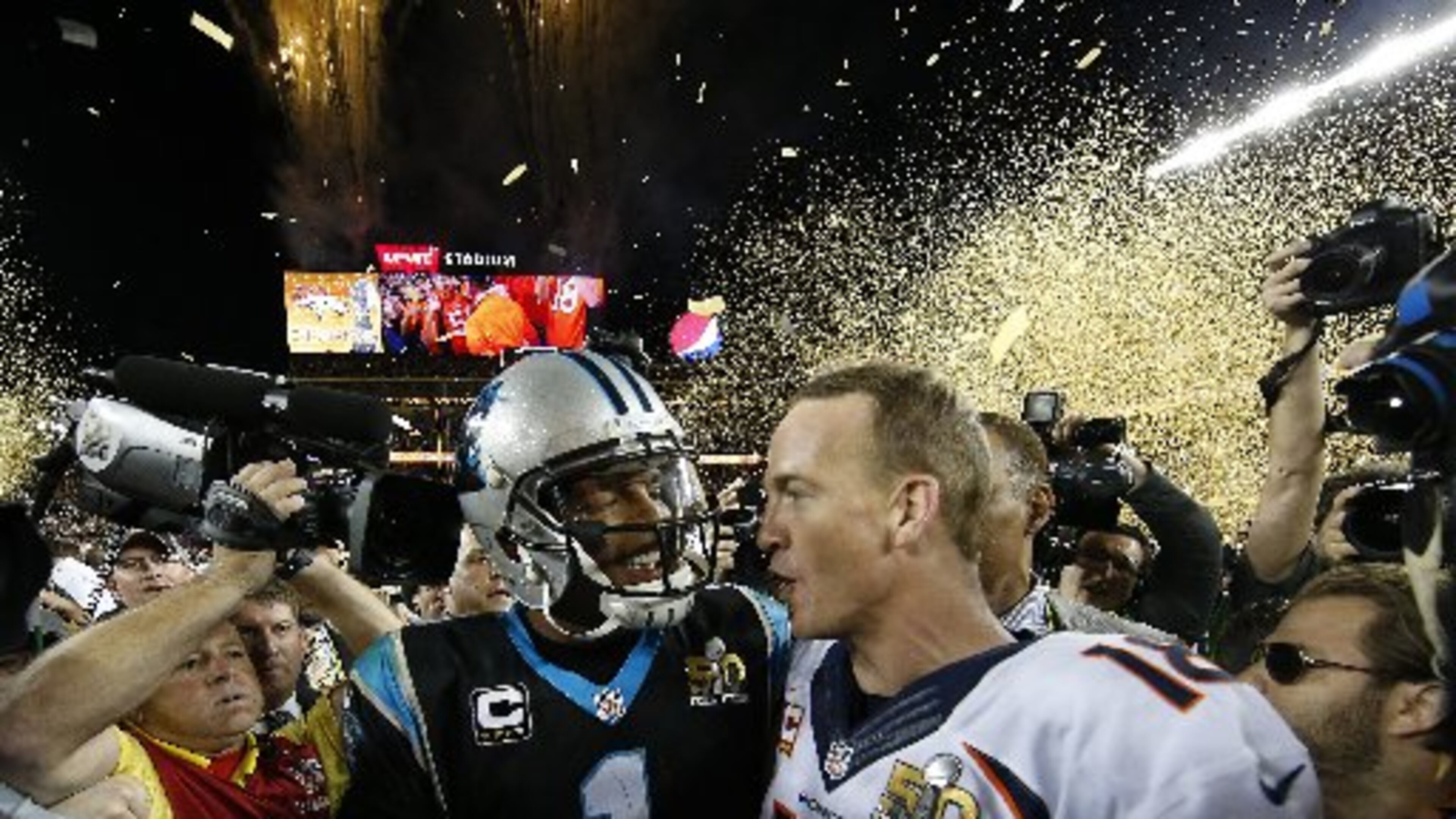Media rip Newton, give Manning a pass

Media blasted Cam Newton for being non-responsive and cutting short his press conference following Carolina's Super Bowl loss. It was his fault. Hardly anyone likes a sore loser, and Newton gave his critics an opening they eagerly took.
Sanctimonious hacks had been waiting for their chance to give the cocky hip-hop quarterback his comeuppance but Newton not only wouldn't play along after the game but wasn't sufficiently contrite days later. Fickle fans cheer players and coaches for giving the finger to media members who ask dumb questions and try to stir up controversy but now are outraged that Newton didn't give proper deference to media members who wanted to ask him dumb questions and stir up controversy.
The issue got plenty of attention but it was silly and relatively harmless in the big picture. Self-important commentators chastise polarizing quarterback, news at 11.
Now here's a much more substantial story about the winning Super Bowl quarterback, Peyton Manning. It complicates the narrative of him as the humble quarterback in contrast to the arrogant Newton, who may ruin children with his gyrations and played the proverbial race card that is so prominent in the fevered imaginations of reactionaries.
But, like with those HGH allegations, media don't seem to have much interest in exploring the story about allegations that Manning sexually assaulted a trainer when played for the University of Tennessee in 1996:
Peyton Manning is among the athletes cited in a lawsuit filed by a group of women alleging that the University of Tennessee has violated Title IX regulations and created a "hostile sexual environment" through a policy of indifference toward assaults by student-athletes. . . .
The Tennessee lawsuit alleges that in 1996, when Manning was the Volunteers' quarterback, he placed his naked genitals on the face of a female athletic trainer while she was examining him for an injury. Manning has denied that he assaulted the trainer, saying instead that he was "mooning" a teammate. Manning was never the subject of a police investigation in the incident.
The trainer, Dr. Jamie Naughright, later sued Manning. In documents filed on her behalf in the case, the player whom Manning says he was "mooning," Malcolm Saxon, refuted Manning's account. Naughright's lawsuit against Manning was settled in 1997 with the agreement that she leave the university.
Over the weekend, Shaun King of The New York Daily News reported on details of the court filing by Naughright's lawyers in the 2002 defamation lawsuit against Manning; his father Archie, and the ghostwriter and publisher of the Mannings' book. King had previously criticized what he considered to be the racial double standard in media reactions to Newton's media blow-off and Manning's sullen behavior in the aftermath of the Colts' loss to the Saints in Super Bowl XLIV
The court filing by Naughright's lawyers gives only her side of the story along with supporting testimony. Sports Illustrated obtained additional court documents in which Manning's lawyers question Naughright's version of events and present an affidavit signed by her in August 1996 and another complaint filed in 2002 in which she did not explicitly allege that Manning made sexual contact with her. In a February 1996 deposition Naughright had alleged that Manning made contact with her and characterized the incident as "sexual assault," according to SI.
It's a messy legal saga that spurred multiple lawsuits between the two parties. (SI has a timeline here). To me, the most compelling information contained in the court filings is Saxon's letter to Manning in which he says Manning wasn't mooning him and asks him to come clean. The alleged "mooning" by Manning was the story line that emerged at the time and is the angle that endured for anyone who cares to remember the incident at all.
But now the story is back in the news again thanks to King shining a light on that court filing and the women who filed the Title IX lawsuit against Tennessee. It comes at a time when the media narrative has settled on the modest Manning riding off into the sunset with his second Super Bowl victory, while Newton must humble himself if he ever hopes to do the same.
The lawsuits raise the combustible issue of athletes and sexual harassment and violence. The allegations against Manning cause cognitive dissonance for a public that views him as the aw-shucks corporate pitchman. Those factors mean negative reactions will follow some familiar beats: it happened so long ago so who cares, nobody knows what really happens so why talk about it, Naughright was just looking for a payday, etc.
But what Manning admits to have done—dropping his drawers in the presence of Naughright as part of what he described as a prank—is bad, if not criminal. What Naughright alleges Manning did—make unwanted sexual contact with her and then later defame her—is outrageous. There may be a legal settlement between Naughright and the Mannings but there is no statute of limitations on public indignation about such things.
Yet there will be no such backlash against Manning. Manning-as-villain is not a narrative that many people want, except for maybe Patriots fans still playing the victim over Deflategate. There will not be nonstop examination of the issue by ESPN. SportsCenter was mostly silent on the topic this morning before Outside the Lines examined it. As far as I can tell, ESPN's Web site offers only a wire story about the Title IX lawsuit filed against Tennessee and this opinion column by Howard Bryant on the coverage of Manning vs. Newton.
Clearly there are more important things to discuss, such as that time Newton wasn't compliant with members of the media.

